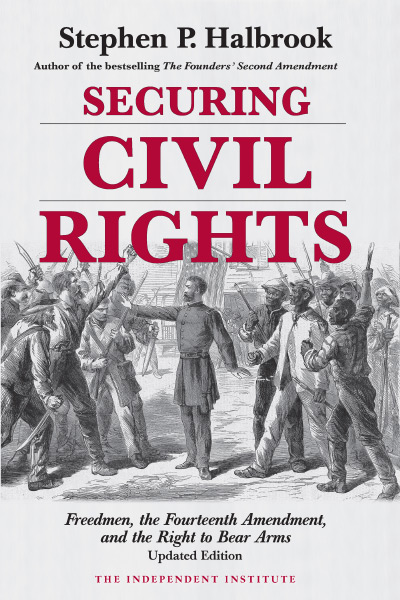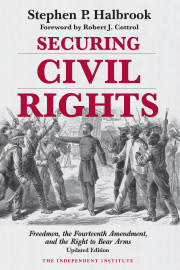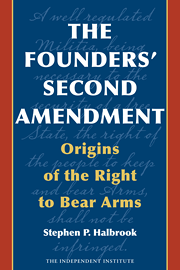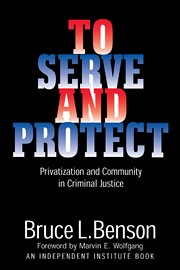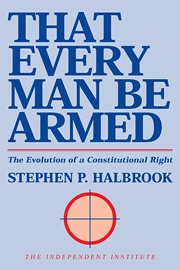| List Price: | ||
| Price: | $19.50 | |
| Discount: | $3.45 (Save 15%) |
| List Price: | ||
| Price: | $19.50 | |
| Discount: | $3.45 (Save 15%) |
Overview
Newly revised 2021 edition of the book is available.
What did it mean to take civil rights seriously—especially the “right to bear arms”—in the years following the abolition of slavery? By quoting legislative debates, Congressional hearings on Ku Klux Klan violence, and newspapers and law books of the time, constitutional scholar Stephen Halbrook shows that both supporters and opponents of the Fourteenth Amendment (1868) believed that it protected all Bill of Rights guarantees—especially the Second Amendment—from infringement by the states.
From the Freedmen’s Bureau Act of 1866 to the Supreme Court’s decision in United States v. Cruikshank (1876), Halbrook paints a vivid portrait of a political and legal system grappling with the true meaning of civil rights.
“Trusting ex-slaves to own firearms was, by any definition, the cutting edge in true belief in civil rights,” Halbrook writes. “It remains to be seen whether contemporary society will accommodate the same rights of the freedmen that the Framers of the Fourteenth Amendment sought to guarantee.”
Although Halbrook concentrates on the right to keep and bear arms, he also includes a comprehensive analysis of the general topic of the relationship between the Bill of Rights and the state governments after the ratification of the Fourteenth Amendment.
Cited by both the U.S. Supreme Court in its historic landmark decision in the McDonald case (2010) and the Washington Supreme Court in State of Washington v. Christopher William Sieyes case (2010) as the leading account of the relationship between the Second Amendment and the states during Reconstruction, Halbrook’s insightful narrative will help a larger audience better understand why earlier generations of Americans viewed the right to bear arms as essential for securing civil rights.
Contents
-
Preface
1. The Civil Rights and Freedmen’s Bureau Acts and the Proposal of the Fourteenth Amendment
2. Congress Reacts to Southern Rejection of the Fourteenth Amendment
3. The Southern State Constitutional Conventions
4. The Freedmen’s Bureau Act Reenacted and the Fourteenth Amendment Ratified
5. Toward Adoption of the Civil Rights Act of 1871
6. From the Klan Trials and Hearings Through the End of the Civil Rights Revolution
7. The Cruikshank Case, from Trial to the Supreme Court
8. Unfinished Jurisprudence
Notes
Table of Cases
Bibliography
Index
About the Author
Detailed Summary
- The U.S. Supreme Court has long since held that the Fourteenth Amendment protects free speech, assembly, trial by jury, and most other Bill of Rights guarantees from state and local violations, but not until 2010 did the Court decide, in McDonald v. Chicago, that keeping and bearing arms is a fundamental right that state and local governments must honor. Securing Civil Rights demonstrates the original understanding that it is a fundamental right.
- In its landmark 2008 decision in District of Columbia v. Heller, the U.S. Supreme Court decided that individuals have a right to have firearms for self-defense and that D.C. may not ban handguns, but it left open whether state and local governments may do so. The Court stated: “In the aftermath of the Civil War, there was an outpouring of discussion of the Second Amendment in Congress and in public discourse, as people debated whether and how to secure constitutional rights for newly free slaves.” To defend that proposition, the Court cited the 1998 edition of this book.
- Historically, the right to keep and bear arms has been a key Bill of Rights guarantee related to the defense of African-Americans from racist violence. The Southern slave codes were the only significant prohibitions on firearms ownership in antebellum America, and the abolitionists sought to extend the right of “the people”—all people—to slaves, whom they sought to set free.
- During Reconstruction, from 1866 to 1876, Congress passed civil rights acts and the states adopted the Fourteenth Amendment to protect the newly won rights of freedmen, including their right to keep and bear arms. Because this entailed trusting former slaves with firearms, application of the arms guarantee was the vanguard of what it meant to take civil rights seriously. The arms that the Amendment’s framers believed to be constitutionally protected included the latest firearms of all kinds, including military muskets and repeating rifles, shotguns, pistols, and revolvers.
- To a man, the same two-thirds-plus members of Congress who voted for the proposed Fourteenth Amendment also voted for the proposition, contained in both Freedmen’s Bureau Bills, that the constitutional right to bear arms is included in the rights of personal liberty and personal security. No other guarantee in the Bill of Rights was the subject of this official approval by the same Congress that passed the Fourteenth Amendment.
- Federal prosecutors brought criminal charges against Klansmen for violation of the First and Second Amendment rights of freedmen. But the Supreme Court held that the Fourteenth Amendment prevented the states, not private individuals, from infringing on these rights.
Does the U.S. Constitution’s Fourteenth Amendment, which protects the rights to personal security and personal liberty from violation by state governments, incorporate the Second Amendment, which declares that “the right of the people to keep and bear arms, shall not be infringed”? The framers of the Fourteenth Amendment believed so—as did their opponents. The Fourteenth Amendment was intended and understood to protect basic rights—above all, the right to have arms for self-defense—from infringement by state and local governments, which had passed statutes that restricted the civil liberties of former slaves in the post–Civil War South.
In Securing Civil Rights: Freedmen, the Fourteenth Amendment, and the Right to Bear Arms, noted attorney and legal scholar Stephen P. Halbrook illustrates the importance of the right to bear arms in the context of the African-American experience during Reconstruction, when the freedmen sought to exercise their Second Amendment rights to protect their newly won civil liberties from violation first by the Southern States and then by the Ku Klux Klan.
“Trusting ex-slaves to own firearms was, by any definition, the cutting edge in true belief in civil rights,” Halbrook writes. “It remains to be seen whether contemporary society will accommodate the same rights of the freedman sought to be guaranteed by the Framers of the Fourteenth Amendment.”
Although Halbrook concentrates on the right to keep and bear arms, he also includes a comprehensive analysis pertinent to the general topic of incorporation of the Bill of Rights into the Fourteenth Amendment.
The Civil Rights and Freedmen’s Bureau Acts
Securing Civil Rights begins with a day-by-day account of congressional proceedings that led to the passage of measures meant to protect the rights of freedmen from oppressive statutes designed to reinstate slavery through the back door. Those so-called black codes had made it a crime for freedmen to testify in court, purchase real estate, travel without a work permit—and keep and bear firearms.
The weapon bans rendered freedmen incapable of protecting their personal property and security from opportunistic criminals and violent reprisals by embittered whites. Two weeks after passage of Mississippi’s statute, for example, a black private assigned to the Freedmen’s Bureau in that state reported that ex-Confederates were now disarming blacks, taking their money and possessions, “and in many places killing.”
When the report reached the halls of Congress, Republican leaders hurried to enact legislation to protect the freedmen from rights violations by the states. On December 6, 1865, Representative John Bingham introduced a joint resolution that would become the Fourteenth Amendment. A month later, Senator Lyman Thrumbull introduced a bill to enlarge the powers of the Freedmen’s Bureau and the Civil Rights Bill—two bills seen as temporary measures to affirm the right to keep and bear arms.
The Freedmen’s Bureau Act declared that “the constitutional right to bear arms” is included among the “laws and proceedings concerning personal liberty, personal security,” and property, and that “the free enjoyment of such immunities and rights” is to be protected. Every senator who voted for the Fourteenth Amendment also voted for the Freedmen’s Bureau Bills and thus for the recognition of the constitutional right to bear arms.
The right to have arms implied the right to use them for protection of one’s life, family, and home against criminals and terrorist groups of all kinds, whether attacking Klansmen or lawless “law” enforcement. To the framers of the Fourteenth Amendment, human emancipation meant the protection of this great human right from all sources of infringement, whether federal or state.
Congress Reacts to Southern Rejection of the Fourteenth Amendment
As Congress debated the Fourteenth Amendment and the second Freedmen’s Bureau Bill, Southern courts nullified the Civil Rights Act, and the Southern state militias continued to disarm the freedmen and commit other abuses. Congress reacted by disbanding the militias and requiring those states—under threat of military rule—to adopt constitutions consistent with the Fourteenth Amendment.
The records of the states make clear that contemporaries believed the amendment incorporated the Bill of Rights, especially the right to keep and bear arms, against the state governments. Opponents of the amendment argued that it was unnecessary because blacks were already protected in all rights of citizenship (which the Dred Scott decision said included keeping and bear arms) other than suffrage.
After examining Congress’s reaction to the Southern rejection of the Fourteenth Amendment, Halbrook looks at the extent to which the amendment was perceived as incorporating the Second Amendment at the constitutional conventions of twelve states: Maryland, Alabama, Louisiana, Virginia, Georgia, Arkansas, Mississippi, South Carolina, North Carolina, Florida, Texas, and Tennessee.
The Freedmen’s Bureau Act Reenacted and the Fourteenth Amendment Ratified
The 1866 Freedmen’s Bureau Act, which had a two-year life, was renewed in 1868 for an additional year. Enacted on July 6, 1868, the second Freedmen’s Bureau Act also required the Secretary of War to reestablish the Bureau in areas where it had been discontinued and where “the personal safety of freedmen shall require it.” In addition, it provided that Bureau operations would be discontinued in states that reentered the Union, unless the Secretary of War found that the Bureau’s continuation was necessary.
By passing the 1868 Act, Congress reaffirmed that the rights of personal security and personal liberty included “the constitutional right to bear arms.” On July 28, 1868, just days after enactment of the Freedmen’s Bureau legislation, it was officially proclaimed that the Fourteenth Amendment had been ratified by three-fourths of the states and was now a part of the U.S. Constitution. Congress then passed statutes repealing the prohibition of the Southern state militias.
Toward Adoption of the Civil Rights Act of 1871
To enforce the rights declared in the Fourteenth Amendment, Congress enacted the Enforcement Act of 1870 and the Civil Rights Act of 1871. The legislative histories of these Acts are saturated with expressions of the intent to protect the rights of freedmen to keep and bear arms. The Enforcement Act criminalized private-party violations of rights “granted or secured” by the Constitution, such as attacks by the Ku Klux Klan in the Southern States.
The Civil Right Act 1871, in addition to suppressing Klan violence, was designed to remedy infringement of rights under color of state law. Aside from the Fourteenth Amendment, this Act was the most important and lasting accomplishment of the Reconstruction Congress in support of civil rights and the liberation of the freedmen.
The rest of Reconstruction was consumed with the outer limits of the state action requirement of the Fourteenth Amendment, and in particular with whether the amendment made it a federal crime for private individuals to conspire to deprive freedmen of the rights to assemble and to bear arms. The drama would now shift from the halls of Congress to the federal courts.
From Klan Trials to the Cruikshank Case
After passage of the 1870 Enforcement Act, federal prosecutors began to bring indictments alleging violations of Bill of Rights freedoms and interference with the right to vote on account of race (a violation of the recently ratified Fifteenth Amendment). After federal courts in Alabama and Mississippi upheld such indictments, similar indictments were brought against members of the Ku Klux Klan in South Carolina.
Klan activity became the focus of Congressional hearings. In a typical incident, a black Georgia man testified how Klansmen broke into his house and shot him three times. In other incidents, Klansmen were indicted and convicted for having robbed blacks of their guns.
One indictment in Grant Parish, Louisiana, culminated in an 1876 Supreme Court decision that was the climax of the debate over whether private action can constitute a violation of rights guaranteed by the U.S. Constitution. The Court decided in United States v. Cruikshank that Congress had no authority to protect persons against the private infringement of the right to bear arms, which, like other local crimes, was a liberty or property interest for the states to protect.
Unfinished Jurisprudence
Securing Civil Rights concludes with an analysis of the pre-Heller jurisprudence of the Supreme Court concerning the Second and Fourteenth Amendments. After dissecting post-Cruikshank cases, Halbrook outlines twentieth century developments by tracing the incorporation of substantive Bill of Rights guarantees into the Fourteenth Amendment, the Court’s pronouncements on the Second Amendment, and the role of the Freedmen’s Bureau Act as an interpretative source of the Civil Rights Acts of 1866 and the Fourteenth Amendment.
Praise
“Halbrook touches two hotly contested issues in American constitutional history. It is a contribution to both the Second Amendment debate and the incorporation controversy over the extent the Fourteenth Amendment applies the Bill of Rights, and especially the right to bear arms, to the states. . . . Halbrook has written a book that contributes significantly to our understanding of the linkage between the Second and Fourteenth Amendments. Although his primary concern has been to bring back the Second Amendment from a moribund state in American jurisprudence, Halbrook’s efforts also shed considerable additional light on broader questions.”
—Journal of Southern History
“In the aftermath of the Civil War, there was an outpouring of discussion of the Second Amendment in Congress and in public discourse, as people debated whether and how to secure constitutional rights for newly free slaves. See generally S. Halbrook, [Securing Civil Rights:] Freedmen, the Fourteenth Amendment, and the Right to Bear Arms.”
—Antonin G. Scalia, Associate Justice, U.S. Supreme Court, in District of Columbia v. Heller
“In his thorough analysis of Congressional debates Halbrook makes quite clear the point that the framers of the Fourteenth Amendment saw Second Amendment guarantees as essential to the political liberty of the individual American citizen.”
—American Journal of Legal History
“The Heller Court also analyzed post-Civil War case law and commentary to conclude a key purpose of the Fourteenth Amendment was to ensure freed blacks had the right to keep and bear arms. Id. at 2810-11; see generally Stephen P. Halbrook, [Securing Civil Rights:] Freedmen, the Fourteenth Amendment, and the Right to Bear Arms.”
—Richard B. Sanders, Justice, Supreme Court of the State of Washington, in State of Washington v. Christopher William Sieyes
“[Halbrook] provides overwhelming evidence that the Fourteenth Amendment was meant to protect the right of individuals to be armed and that this particular right was a major concern of its framers. He offers scholars in the field a wealth of quotations from the historical debates. . . . Above all, Halbrook helps restore the historical record of a badly served constitutional amendment.”
—American Historical Review
“Halbrook’s book demonstrates that many proponents and opponents clearly understood that the Fourteenth Amendment would impose the first eight amendments as limitations on the states. Halbrook does an impressive job of gathering evidence not only from the speeches of Bingham and Howard before, during, and after ratification of the Fourteenth Amendment, but from a variety of other members of Congress, from newspaper coverage, and from law books of the day.”
—National Review
“This is a second edition of Halbrook’s 1998 book, one that has been quoted in the Heller decision and stands to be even more pivotal in the McDonald case . . . . Halbrook marshals impressive evidence that those who advocated the 14th Amendment quite specifically understood it to protect the rights of former slaves to keep and bear arms. They also understood the purpose of keeping those arms was to resist the KKK and other groups seeking to maintain white supremacy. Future Supreme Court decisions sided with southern state governments who intended the opposite, a distortion we can hope the McDonald case will rectify.”
—Shotgun News
“[T]his is a valuable book that should be useful to those who claim to take the Constitution seriously. . . . Halbrook is a talented and indefatigable advocate in the cause of firearms rights, who reads the evidence for all it's worth, and sometimes more. . . . Halbrook's evidence seems quite adequate to establish that if the Privileges or Immunities Clause was meant to incorporate the substance of any of the individual privileges and immunities in the Bill of Rights, it was certainly meant to protect the individual's right to keep and bear arms.”
—Constitutional Commentary
“We receive a lot of books for review, but the timing of Securing Civil Rights (with the pending Supreme Court decision) and its unique content set it apart. In a nutshell, the book argues that the right to keep and bear arms applies to states: Since the Supreme Court is to rule on the Second and Fourteenth Amendments, the book in part addresses how civil rights are historically tied to the right to own firearms, and it provides some intriguing background. . . . Author Halbrook—an attorney whose list of credentials includes Research Fellow at the Independent Institute, most recently, coauthor of the NRA brief in McDonald v. Chicago—doesn’t beat around the bush when he states unequivocally, ‘The Fourteenth Amendment to the U.S. Constitution was intended and understood to protect basic rights—above all, the right to have arms to protect life itself—from infringements by the States and localities.’ And here’s Halbrook’s take on the upcoming decision: ‘If [the Supreme Court decision is] favorable, gun owners in every state will be able to challenge onerous firearm bans, such as the semiautomatic rifles mislabeled ‘assault weapons,’ as well as total prohibitions on the bearing of arms. Where discretionary carry permits are routinely denied, recognition of Second Amendment rights will promote procedural due process.’ And I had to ask: ‘Are these decisions the most important Second Amendment issues addressed in our lifetime?’ ‘Absolutely, yes,’ Halbrook replied. ‘The pillars of serious recognition of the fundamental right to keep and bear arms are twofold. First, it is truly a ‘right of the people’ and not an exclusive collective power to maintain a militia. Second, it may not be infringed not only by the federal government, but also by states and localities. Future cases will concern how the right may be regulated and may fill in the many gaps that will follow the basic recognition of the right.’ Those comments set the table, don’t they? If you want a good read, visit www.independent.org.”
—Guns & Ammo
“Does the Second Amendment apply to the states? . . . Now you can get the top source on the subject: Securing Civil Rights: Freedmen, the Fourteenth Amendment, and the Right to Bear Arms, by Stephen P. Halbrook. . . . Halbrook is one of the leading scholars in the country on the Second Amendment and the Right to Keep and Bear Arms. He has written extensively on the topic, including The Founders’ Second Amendment, That Every Man Be Armed, and Securing Civil Rights. In Securing Civil Rights, Halbrook provides extensive documentation from Reconstruction sources demonstrating that the 14th Amendment to the Constitution was intended to apply the Second Amendment to the states. In this exhaustive text, Halbrook provides a detailed history of the violence directed against freedmen who possessed firearms in the Reconstruction South, and clearly shows that the authors of the 14th Amendment intended to protect the right of newly freed slaves to possess firearms. The book concludes with an analysis of the Supreme Court’s unfinished and incomplete jurisprudence concerning the extent to which the 14th Amendment protects the guarantees of the Bill of Rights, particularly the Second Amendment Right of the people To Keep and Bear Arms.”
—American Rifleman
“As the subtitle explains, Securing Civil Rights is the story of ‘Freedmen, the Fourteenth Amendment, and the Right to Bear Arms.’ Securing Civil Rights details a crucial period in American history that was once obscure, but now, thanks to the U.S. Supreme Court’s decision in McDonald v. Chicago, will be studied by every law student and will be taking its rightful place in the mainstream of American society. After the Civil War, the ex-Confederate state governments accepted the formal abolition of slavery. But many of them attempted to keep the freedmen in de facto servitude. . . . Securing Civil Rights tells this story in careful detail, based almost entirely on records of the time, such as newspaper articles and congressional debates. The book is further buttressed by hundreds of endnotes, supporting every fact and conclusion. . . . Now, the updated 2010 edition from the Independent Institute in California makes the book accessible to a much broader audience. Of the many scholars whose work made the McDonald victory possible, Halbrook was the most influential. When you read this book, you will understand why the Supreme Court finally decided that if the original meaning of the Constitution matters at all, the Supreme Court had the duty to stop local despots like Chicago Mayor Richard Daley from depriving good citizens of their Second Amendment rights.”
—America’s First Freedom
Author
Dr. Stephen P. Halbrook is Research Fellow at the Independent Institute. Dr. Halbrook received his J.D. from the Georgetown University Law Center and Ph.D. in social philosophy from Florida State University, and he has taught legal and political philosophy at George Mason University, Howard University, and Tuskegee Institute. He is the author of the bestselling The Founders’ Second Amendment among many other books.
News
Events
| Event | Date | |
| Sr. Fellow Stephen Halbrook, author of Securing Civil Rights speaks at The Federalist Society in Washington, DC on Tuesday, January 15, 2019 | Tue., Jan. 15, 2019 | |
| Sr. Fellow Stephen Halbrook, author of The Founders’ Second Amendment and Securing Civil Rights speaks at The Federalist Society in Washington, DC on Tuesday, January 15, 2019 | Tue., Jan. 15, 2019 | |
| Senior Fellow Stephen Halbrook speaks at the conference, “The Second Amendment: Its Meaning and Implications for Modern America,” Duncan School of Law, Lincoln Memorial University | Thu., Jan. 18, 2018 |

